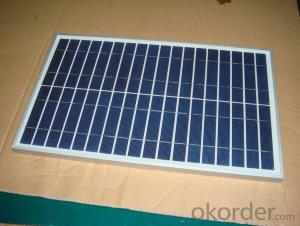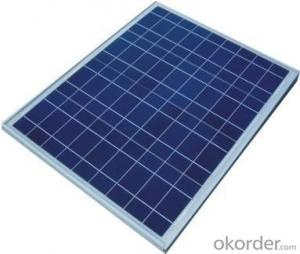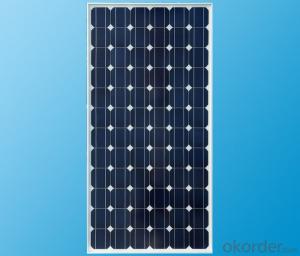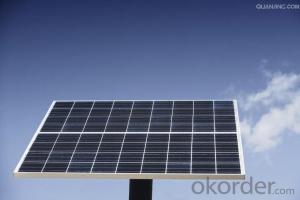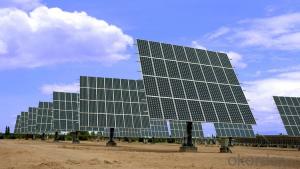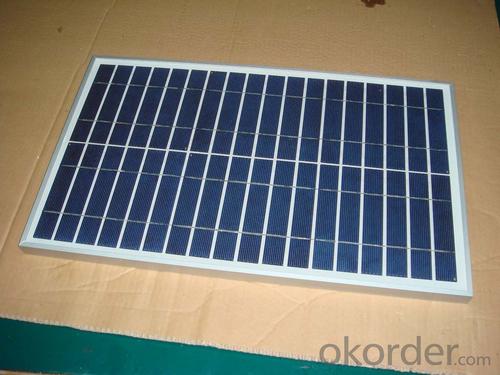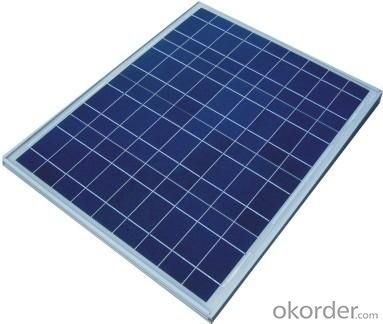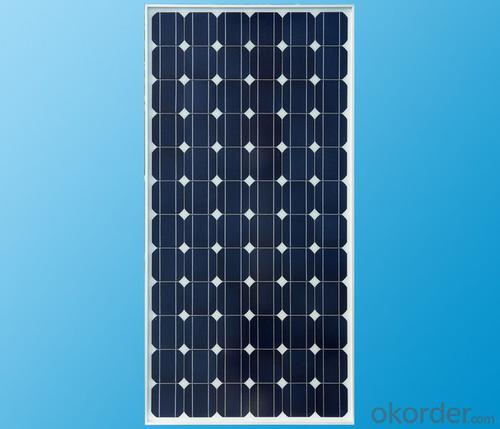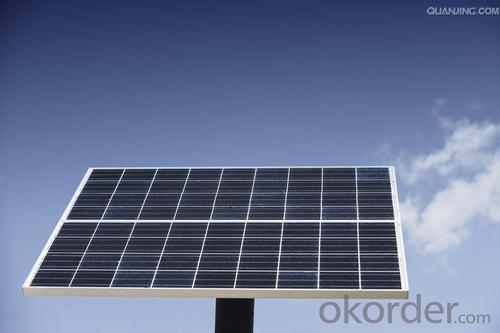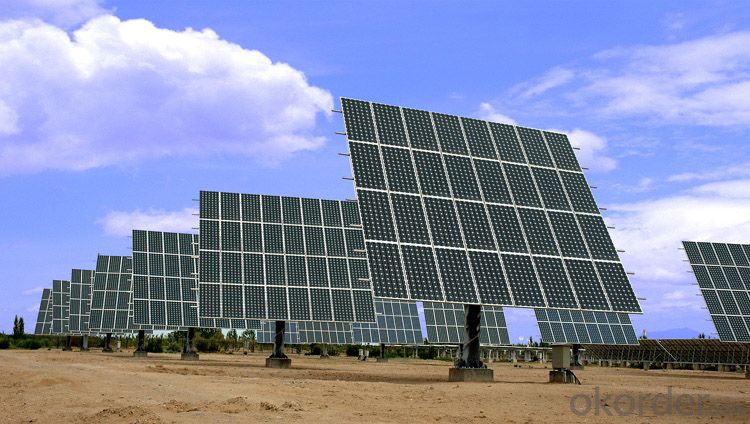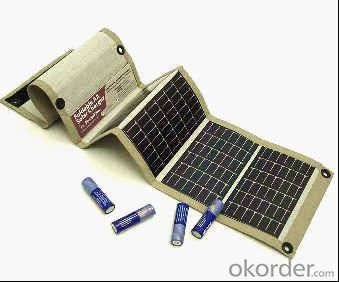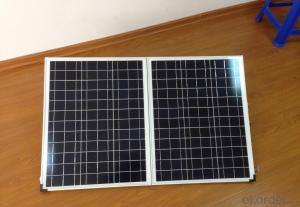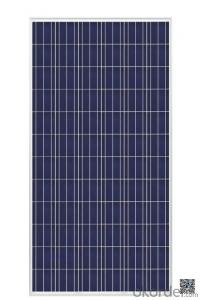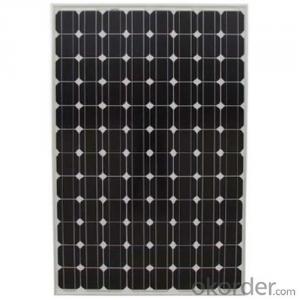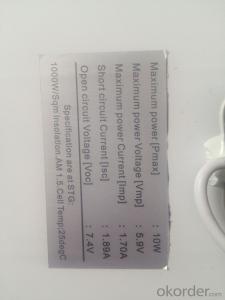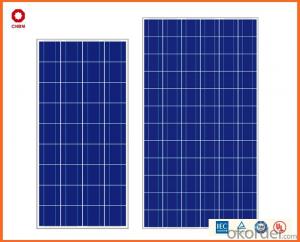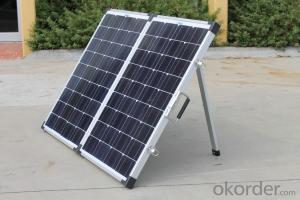Solar Panels for Camping Trailers:Mono Foldable Solar Panel for Camping Solar Power System
- Loading Port:
- China main port
- Payment Terms:
- TT or LC
- Min Order Qty:
- 1 pc
- Supply Capability:
- 10000000 pc/month
OKorder Service Pledge
OKorder Financial Service
You Might Also Like
1.Structure of Solar Module Description
CNBM Solar's photovoltaic module is designed for designed for large electrical power requirement. It is the optimal choice for both on-grid and off-grid power systems. CNBM Solar offers high performance of power per square foot of solar array.
2.Main Features of the Solar Module
Solar Cell: High efficency crystalline solar cell. Even if under the weak light, the solar module can produce maximum power output.
Tempered glass: Anti-reflecting coating and high transmission rate glass increase the power output and mechanical strength of solar module.
EVA and TPT: Using high quality EVA and TPT to prevent destroying and water.
Strong aluminum frames to strengthen the load hold and to stand against high wind.
Junction box: Multi function junction box with water proof.
Long lifetime: ≥25 years; Less power decrease.
Good performance of preventing from atrocious weather such as wind and hails.
Resisting moisture and etching effectively, not effected by geology.
The certificate issued by international authority: UL, TUV, IEC, VDE, CE.
Quick Details
| Place of Origin: | Zhejiang China (Mainland) | Brand Name: | DEJIE | Model Number: | DJ-SP |
| Material: | Polycrystalline Silicon | Size: | 54*31*2.8mm | Number of Cells: | 10pcs |
| Max. Power: | 0.17w | materials: | epoxy resin |
Packaging & Delivery
| Packaging Detail: | Bubble bag outer Carton |
| Delivery Detail: | 10days |
3.Solar Module Images
4.Solar Module Specification
1: Long Service Life
2: High Efficiency Solar Cells
3:RoHS/CE
4:High Intensity PCB Board
5: Customized Size and Paramete
low price 0.1w to 3w mini small solar panel
Epoxy solar panel structure
It is a traditional type small solar panel called epoxy resin encapsulated solar panel, which is sticked together by epoxy resin glue at a temperature 50~60 degree, you will see the epoxy resin coated panel have three layers,
1. Epoxy Resin AB Glue
2. Solar Cells
3. PCB Board
Features
1): Epoxy resin solar panel is made of monocrystalline or polycrystalline silicon. The encapsulation material are made of Epoxy Resin. Characterized by anti-humidity, insulation, excellent transparence and anti-aging, as well as smoothness, no bubble and neat apperance. Hard appearance; long-time life, high-performance to week light; widely used in lamp series, no power source sector.
2): Epoxy resin solar panels are easily to install; friendly environmental. High efficiency solar cells, Non-stick protective film.
3):Epoxy resin solar panels can be widely used in solar lawn lamps, solar toys, solar chargers and solar signal lights.
Epoxy Resin Solar Panel Manufacturing Process:
Cut—Assemble—Test—Epoxy Resin—Vacuumize—Bake—Inspect—Coating
Why Choose us?
Have a very strong and professional QC and selling Team
OEM Service Offered/Design Service Offered/Buyer Label Offered
Factory supplier directly
welcome to visit our factory
5.FAQ of Solar Module
1. Q: Do you have your own factory?
A: Yes, we have. Our factory located in Jiangyin city, jiangsu province.
2. Q: How can I visit your factory?
A: Before you take off from your country, please let us know. We will show you the way,or arrange time to pick you up if possible.
3. Q: Do you provide free sample?
A: Usually we do not offer free sample
4. Q: Could you print our company LOGO on the nameplate and package?
A: Yes, we can do that.
- Q: I know that there is a life expectancy for solar panels, and I suppose, the technology involved. Any information?
- Great okorder
- Q: Can solar panels be installed on a metal roof?
- Yes, solar panels can be installed on a metal roof. In fact, metal roofs are often considered ideal for solar panel installations due to their durability, longevity, and compatibility with the mounting systems. Metal roofs provide a stable and secure foundation for solar panels, ensuring optimal performance and longevity of the system.
- Q: Can solar panels be used in areas with high humidity?
- Yes, solar panels can be used in areas with high humidity. However, high humidity can potentially reduce their overall efficiency due to increased moisture in the air, which may affect the performance of the panels. It is important to ensure proper maintenance and cleaning of the panels to prevent any buildup of dirt or moisture, which can further affect their performance in humid conditions.
- Q: Can solar panels be installed on commercial buildings?
- Yes, solar panels can be installed on commercial buildings. In fact, many businesses and organizations are increasingly opting for solar panel installations to reduce their energy costs and environmental impact. By harnessing sunlight and converting it into electricity, solar panels provide a sustainable and renewable source of power for commercial operations.
- Q: I want to know that if I put solar panels in space if Pluto can recieve energy for iPods and television
- I'm definitely no expert in the field but hope to learn much more in the future. I'm in the infancy stage of researching as many options as possible in the design and construction of a total green house. That being said, a particular local news story sparked my interest when they investigated the cost effectiveness of residential solar panel systems. Here in Austin, Texas, through subsidies and incentives offered, you can install a system that costs roughly 22.5k for about 7. Apparently these deductions come from a federal incentive (which is a very small portion) combined with those set by the city itself. Austin is a pretty progressive city so I imagine their incentives might be a little better than most but you can call your city's general info line (3) and do a little more digging. Another option you might have is renting the equipment. I was told yesterday that a company here in town would allow for the installation and use for a monthly rate. I know how tight cash can be in school and 7 thousand might not be tangible. The whole issue of energy conservation is so prevalent these days that new info is constantly coming out. Give your current energy provider a call and see what they can tell ya. I hope you find something that works for you. -G
- Q: hi so im doing a school project thing and they have a lot of different questions for us that help us decide whether we would rather a city have a nuclear reactor, or solar panel. But i cant seem to get the last 2 questions...help please???so question ........What types of emissions, if any, are produced by each type of generating station? Do these emissions affect human health?question 2.....What are the long term financial costs associated with maintaining each type of generating station?thanks!
- There's no standard nuclear reactor, but if we take a GW nuclear plant, it can generate about 8 terawatt-hours/year. A 200 watt solar panel can generate about kilowatt- hour/day, or 365 kwh/year, so that's about 2 million 200 watt solar panels. However, the power output from the nuclear plant is controllable by the operators, where solar panels only operate at full output for a few hours/day (on clear days - less if there's cloud). Therefore, to compare the two, you have to factor in some kind of energy storage or backup which will increase the cost of the solar installation (perhaps by a factor of two or more). Despite claims of solar being cheaper than coal now, when one compares apples to apples (i. e. total energy produced, and controllability) solar is still several times more expensive than coal, and about twice as expensive as nuclear even in the U. S. A gram of U-235 can make usable energy equal to three metric tons of coal. Solar energy production has no hazardous by-products, but manufacture of the panels can involve some very hazardous materials like fluorine (for silicon panels) or cadmium (for CdTe panels). This is part of the reason panel manufacture has gone to Asia - they have fewer environmental regulations and it's easier to dispose of the byproducts of production. DK
- Q: Why are they placed there? How come they aren't placed on the floor or window.My fiance and I are interested in putting solar panels on our new home. I was really curious and google wasn't giving me the answer. My roof is pretty small in our new house and I don't think it would fit there. Why is it usually placed there and is there another place? You will be chosen as best answer if you answer all my questions. Thanks in advance, and I would appreciate if nobody is rude. Otherwise, I will have to report abuse.
- in case you had 2 mind cells to rub at the same time, think about nicely-known that at present's image voltaic panels are more suitable in each thanks to the antiquated, out of date, artifacts you're blathering and spewing about. If any image voltaic panels are happening the white domicile, they're going to be cutting-side. once again, technological awareness and expertise have moved on and left you choking of their dirt, scratching your azz and furrowing your neanderthal little foreheadin a futile attempt to understand what has occurred.............
- Q: Can solar panels be installed on a shopping mall or retail complex?
- Yes, solar panels can be installed on a shopping mall or retail complex. In fact, many commercial buildings have already embraced solar energy as a way to offset their electricity consumption and reduce their carbon footprint. By installing solar panels on rooftops or parking structures, shopping malls and retail complexes can generate clean and renewable energy, leading to cost savings and environmental benefits.
- Q: I want to be more self sufficient and get solar panels for electricity in a small house any tips will help. i need to know how many watts is enough and ect.
- That's okorder , they have been extremely helpful from the initial planning process to the installation and upkeep. Use their Solar Panels Online Solar Sizer to determine how much solar you will require. A lot of it depends on your usage and size of home, but also where in the US you live. Best of luck.
- Q: Can solar panels be installed on a warehouse or industrial facility?
- Yes, solar panels can be installed on a warehouse or industrial facility. In fact, these large rooftops often provide ideal conditions for solar panel installations, as they have ample space to accommodate a significant number of panels. Installing solar panels on warehouses or industrial facilities can help offset energy costs, reduce carbon emissions, and contribute to the organization's sustainability goals.
Send your message to us
Solar Panels for Camping Trailers:Mono Foldable Solar Panel for Camping Solar Power System
- Loading Port:
- China main port
- Payment Terms:
- TT or LC
- Min Order Qty:
- 1 pc
- Supply Capability:
- 10000000 pc/month
OKorder Service Pledge
OKorder Financial Service
Similar products
Hot products
Hot Searches
Related keywords
